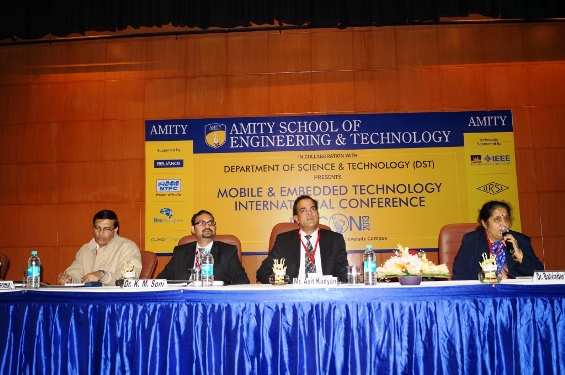18 Jan 2013|Noida | Amity University Campus, Sector-125, Noida
International Conference "MECON-2013" concludes at Amity University

Amity School of Engineering and Technology organized the first International Conference on “Mobile and Embedded Technology”, in collaboration with DST (Department of Science and Technology), URSI (International Union of Radio Science) at Amity University, sector-125, Noida.
This conference aimed to set platform for scientists and academicians to share their experiences and research with technical fraternity from various walks of life. During the two day long conference students were apprised with the practical know how shared by the industry leaders through various technical sessions which were held related to the theme of the conference.
During the Valediction Dr. Balvinder Shukla, Acting Vice Chancellor, Amity University Uttar Pradesh said that MECON-2013 has given a chance to students and researchers to get familiarized with the time-honored practices in mobile communication and were briefed to use old technology in new ways. She also added that the scope of the conference was to lay emphasis on the tremendous advances in mobile communications and embedded systems technology.
Addressing the gathering Mr. S. C. Sharma, Director, Dept. of Information Technology, Govt. of India said that the idea of this conference was to learn from each other. The new technologies which are introduced nowadays are fast and embedded to easily reach to the masses & also are cost effective. Issues related to the mobile technologies are many and these kind of conferences help the industry people to overcome those issues.
The technical session chaired by Dr. Rajeev Kapoor, DTU Delhi was an interesting and knowledgeable discussion on Image processing where in few paper presentations took place. Research papers were presented on Adaptive Algorithm for Hand Segmentation and Tracking of Continuous Hand Posture Recognition & Retina and Fingerprint based Biometric Identification System, etc.
Presenting a research paper on “Bluetooth Technology: Key Challenges and Initial Research”, Mohammed Ishaq Siddique from Department of CSE, ABES Engineering College, Ghaziabad stressed that Bluetooth is a recently proposed standard for short range, low power wireless communication and is envisioned simply as a wire replacement technology. But Bluetooth has a potential to become much more than a wire replacement technology. It can become the technology of choice for adhoc networks of the future, keeping in view its low power consumption and potential low cost but at the same time it needs to overcome multitude technical hurdles like topology formation and throughput maximization. The speaker shared that their team is already working in this area and called upon the fellow researchers to take up advance research in this promising area.
Sharing his views on “Mobile Computation using Cloud Computing”, Mr. Sandeep Kumar Mathariya- Patel College of Science and Technology, Indore said that today, mobile devices such as smart phones, tablets have become indispensable part of our lives. With their growing popularity, users have come to rely more and more on them as their primary computation and communication devices and are beginning to expect functionality and performance similar to that of traditional computing devices such as desktops. However, meeting such expectations on these devices is challenging due to several reasons. First, they are battery powered limiting their power capabilities. As the devices become more popular and their use becomes more frequent, the increasing energy consumption becomes a key bottleneck in their computational capability. Secondly, Mobile devices are limited in their ability to execute rich user applications involving extensive use of computer vision and graphics, speech recognition which can be resource intensive.
Further dwelling on the concept of Mobile Cloud Computing (MCC), the speaker shared that MCC can help to overcome limitations of mobile devices specially processing power and data storage. It might also help to extend the battery life by moving the execution of commutation- intensive application “to the cloud”. Further developments will allow mobile devices with unique features that can sense the environment and physiological parameters to enhance the quality of life and even, remote monitoring of patients.
Various other topics discussed during the two day conference were Energy Harvesting Sensor Networks, Embedded Systems and Real Time Operating Systems, Provisioning QOS in Adhoc Networks using Fuzzy Logic, RF Frontends for 60GHz WPAN Networks, Issues and Challenges in Wireless System Design, Qualnet: Today & Tomorrow, Low Bit Error Rate ZigBee Baseband Transceiver Design for IEEE 802.15.4, Performance Evaluation of Different Handoff Scenarios within 3GPP Long Term Evolution (LTE) Networks, Carrier Aggregation for Enhancement of Bandwidth in 4G Systems, Bluetooth Technology: Key Challenges and Initial Research, Adaptive Gain Aided Multi Antenna Set-ups for Stochastic Wireless Channels, CMOS Integrated Nan photonics: Feasibility & Challenges, A Real Time Algorithm for Disease Classification using ECG, Micro-Synthetic Aperture Radar (µ-SAR), Development of a Low Cost Module for Monitoring and Protection of Transformers, Performance Analysis of Digital Image Compression, etc.
The other speakers present during the conference included Mr. Asit Kadyan, Director, Dept. of Telecommunication, Govt. of India, Dr. K. M. Soni, Deputy Director, ASET, Convener, MECON 2013, Dr. Animesh Maitra, Institute of Radio Physics and Electronics, University of Calcutta, Sandeep Mathariya, Patel College of Science and Technology, Indore, M.P, etc.